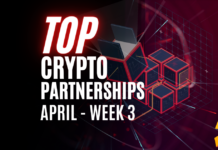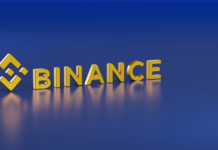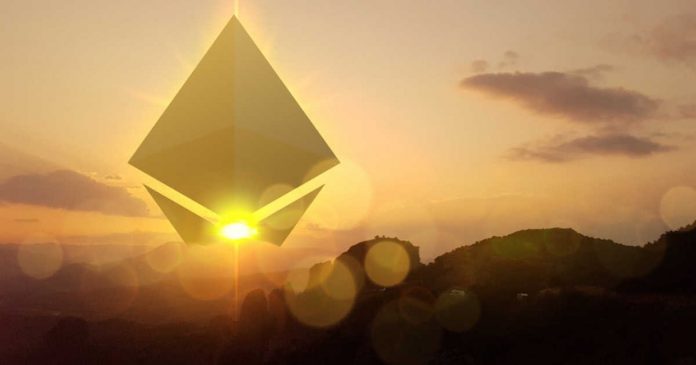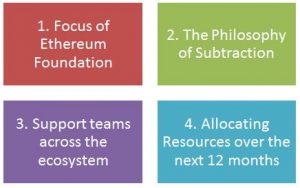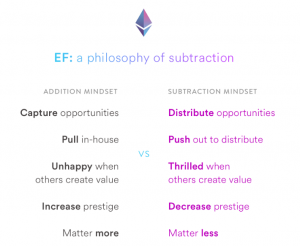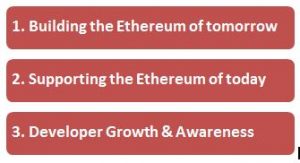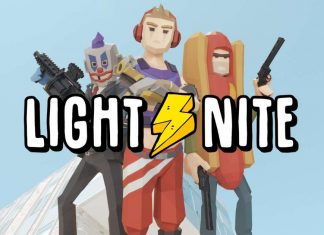The Ethereum Foundation is a non-profit organization dedicated to the development of Ethereum and plays a central role in allocating resources, providing a voice in the ecosystem, advocating Ethereum to the world. The community consists of developers, entrepreneurs, researchers, and passionate users. With ETH 2.0 now moving closer to key milestones, the Ethereum Foundation team have released (on May 21st) their updated role and plan for next year.
We have tried to present a simplified version of the plan across 4 broad areas:
-
The focus of the Ethereum Foundation
Ethereum Foundation has refined its focus. “Doing what is best for Ethereum” doesn’t mean trying to do everything — it means focusing on where it can add the most value, and leaving space for others to add value in the areas that they will be the most effective.
Resource Allocator
The Foundation’s focus includes:
- Effective Spend Management
- Grow the Ethereum ecosystem’s funding base (through other organizations)
- Support innovative mechanisms for funding, including Gitcoin grants and MolochDAO
A voice in the ecosystem
By being a voice in the ecosystem the Foundation will aim to:
- Bring attention to important but relatively unknown projects
- Share valuable information about Ethereum’s progress with the public
- Encourage the growth of regional Ethereum communities.
An advocate for Ethereum to the world
Representing Ethereum to the outside world (a major company, a government or a regular person) and act as their first stop to understand Ethereum.
-
The Philosophy of Subtraction
The Ethereum Foundation has adopted the interesting Philosophy of Subtraction. Instead of pulling everything in-house, resources are pushed out to teams across the ecosystem. This means Ethereum is becoming more decentralized and sustainable.
Source: Ethereum Blog
-
Support teams across the ecosystem
ETH 2.0 client teams
ETH 2.0 is a name given to a set of transformative upgrades for the Ethereum protocol.
- Over the last few months, the Client Teams like Nimbus, Prysm, and Sigma Prime’s Lighthouse test nets have launched. These teams and others are now stabilizing and optimizing their clients, getting ready for multi-client test nets.
- Many resources are shifting into testing, fuzzing, and audits over the coming months.
- The Foundation engaged Runtime Verification to formally verify the deposit contract and to formally specify the Beacon Chain.
ETH 1.x
The ETH 1.x initiative focuses on improving Ethereum’s short term scalability and sustainability with an eye to easing the transition to ETH 2.0. Funded efforts include:
- Alexey Akhunov’s research into stateless clients and state fees
- Andrew Ashikhmin’s research into sync protocol improvements
- Essential projects like Geth and Solidity
ZK-rollup
ZK-rollup uses succinct zero-knowledge proofs to enable Ethereum to reach hundreds of transactions per second. The Foundation has supported Barry Whitehat and Matter Labs’ collaboration.
ETHGlobal
ETHGlobal hosts Ethereum hackathons around the world focused on onboarding new developers into the ecosystem and facilitating project and company creation.
Ethereum Academic and Research Collaboration
- Collaboration with mathematicians, computer scientists, and economists leading to progress on
- Casper CBC
- VDFs
- Plasma constructions
- Succinct zero knowledge proof based systems
- Safety bounds for Ethereum 2.0
- The Cryptophage collaboration between the Ethereum Foundation, Supranational, and Protocol Labs produced a solution to renowned cryptographer Ron Rivest’s LCS35 time capsule crypto-puzzle that required only two months, as opposed to the projected 35 years.
Working with prominent organizations to encourage their engagement with the Ethereum ecosystem
- Microsoft – in a long-term commitment to support the Ethereum developer experience through Visual Studio Code and the new Azure Blockchain Service.
- HTC and Opera – encouraging them to engage with the Ethereum community and support Ethereum-based applications, and
- UNICEF – to help find ways to use Ethereum for social good.
-
Allocating Resources over the next 12 months
Over the next year, the Ethereum Foundation plans to spend $30 million USD on key projects across the ecosystem. This budget is insulated against downward ETH price movement.
The three primary categories of resource allocation:
- Building the Ethereum of tomorrow
$19 million earmarked over the next 12 months
This fund is preserved for Ethereum’s R&D projects which include:
- ETH 2.0: Client teams, Research, VDF, documentation, and communication
- Layer 2: State channels & Plasma
- Continuing work on eWASM
- Smart contract languages
- Formal verification, auditing, and specification work
- Zero-knowledge R&D, including ZoKrates
- Ethereum “Phase 3 and Beyond” R&D
- Working directly with academic institutions and attracting exceptional research talent
- Supporting the Ethereum of today
$8 million earmarked over the next 12 months.
This fund is used to sustain Ethereum 1.0.
This includes:
- Many initiatives under the banner of “ETH 1.x”
- Geth
- Solidity
- Web3.js and Ethers.js
- Developer Growth & Awareness
$3 million earmarked over the next 12 months
This fund is preserved for developer relations, education, and on-boarding. This is especially important in Asia, where significant opportunity exists for Ethereum to grow.
This includes:
- Developer education & on-boarding
- Supporting community event organizations focused on developers, like ETHGlobal
- Continuing to run Devcon as a yearly gathering for the Ethereum ecosystem
- Supporting regional Ethereum community organizations
- Developer experience improvements and developer tooling
- Attracting exceptional developer talent
- Encouraging browsers and other mass consumer technologies to seamlessly integrate Ethereum into their user experiences
- Continued improvements to ethereum.org
Note: Content of this article has been heavily taken from Ethereum Blog





